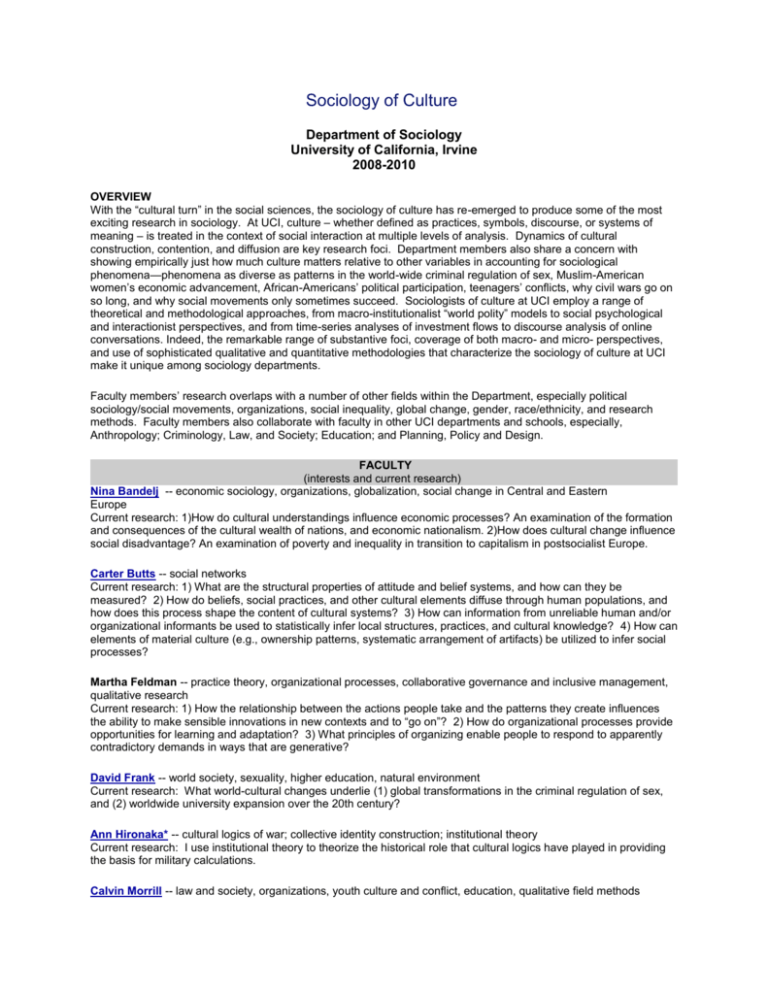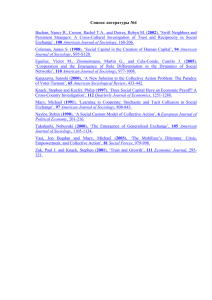Global Inequality & Change - Sociology
advertisement

Sociology of Culture Department of Sociology University of California, Irvine 2008-2010 OVERVIEW With the “cultural turn” in the social sciences, the sociology of culture has re-emerged to produce some of the most exciting research in sociology. At UCI, culture – whether defined as practices, symbols, discourse, or systems of meaning – is treated in the context of social interaction at multiple levels of analysis. Dynamics of cultural construction, contention, and diffusion are key research foci. Department members also share a concern with showing empirically just how much culture matters relative to other variables in accounting for sociological phenomena—phenomena as diverse as patterns in the world-wide criminal regulation of sex, Muslim-American women’s economic advancement, African-Americans’ political participation, teenagers’ conflicts, why civil wars go on so long, and why social movements only sometimes succeed. Sociologists of culture at UCI employ a range of theoretical and methodological approaches, from macro-institutionalist “world polity” models to social psychological and interactionist perspectives, and from time-series analyses of investment flows to discourse analysis of online conversations. Indeed, the remarkable range of substantive foci, coverage of both macro- and micro- perspectives, and use of sophisticated qualitative and quantitative methodologies that characterize the sociology of culture at UCI make it unique among sociology departments. Faculty members’ research overlaps with a number of other fields within the Department, especially political sociology/social movements, organizations, social inequality, global change, gender, race/ethnicity, and research methods. Faculty members also collaborate with faculty in other UCI departments and schools, especially, Anthropology; Criminology, Law, and Society; Education; and Planning, Policy and Design. FACULTY (interests and current research) Nina Bandelj -- economic sociology, organizations, globalization, social change in Central and Eastern Europe Current research: 1)How do cultural understandings influence economic processes? An examination of the formation and consequences of the cultural wealth of nations, and economic nationalism. 2)How does cultural change influence social disadvantage? An examination of poverty and inequality in transition to capitalism in postsocialist Europe. Carter Butts -- social networks Current research: 1) What are the structural properties of attitude and belief systems, and how can they be measured? 2) How do beliefs, social practices, and other cultural elements diffuse through human populations, and how does this process shape the content of cultural systems? 3) How can information from unreliable human and/or organizational informants be used to statistically infer local structures, practices, and cultural knowledge? 4) How can elements of material culture (e.g., ownership patterns, systematic arrangement of artifacts) be utilized to infer social processes? Martha Feldman -- practice theory, organizational processes, collaborative governance and inclusive management, qualitative research Current research: 1) How the relationship between the actions people take and the patterns they create influences the ability to make sensible innovations in new contexts and to “go on”? 2) How do organizational processes provide opportunities for learning and adaptation? 3) What principles of organizing enable people to respond to apparently contradictory demands in ways that are generative? David Frank -- world society, sexuality, higher education, natural environment Current research: What world-cultural changes underlie (1) global transformations in the criminal regulation of sex, and (2) worldwide university expansion over the 20th century? Ann Hironaka* -- cultural logics of war; collective identity construction; institutional theory Current research: I use institutional theory to theorize the historical role that cultural logics have played in providing the basis for military calculations. Calvin Morrill -- law and society, organizations, youth culture and conflict, education, qualitative field methods Current research: 1) How do law and rights matter in everyday practices within and around schools? 2) How does the increasing criminalization of youth culture shape the ways youth and adults define and act on youth conflict? 3) What is the relationship between collective action and culture change in institutional fields? Francesca Polletta -- social movements, democracy and deliberation, discourse analysis, storytelling. Current research: 1)Are women disadvantaged in political discussions by a distinctive communication style? 2)How do cultural models of democracy, conflict, and power shape the practice—and the variable success—of public deliberation? Jen’nan Read -- gender, ethnicity, religion, and health Current research: 1) How do different dimensions of cultural identity, namely ethnic and religious dimensions, shape gender dynamics in U.S. immigrant communities? 2) To what extent does ethnic and religious identity influence Muslim American political incorporation, and to what extent do these identities converge and diverge? Belinda Robnett-Olsen -- social movements, race/ethnicity, gender, African American politics, the relationships between institutions, gender, political participation and collective action. Current Research: 1) How do gendered cultural relations impact collective action and social movement agendas? 2) How are racial hierarchies gendered? 3) How does the gendered nature of institutions affect men’s and women’s types and rates of political participation? 4) In what ways are the mobilization processes of collective action gendered? Evan Schofer -- Comparative Political Sociology; Sociology of Education; Globalization and Global Culture; Environmental Sociology. Current Research:1) The Origins of NGOs: Examines the role of global culture and national states structures in encouraging the global proliferation of voluntary associations. 2) Educational structures and economic inequality: Explores how the organizational features of education systems shape cultural categories and status distinctions as well as subsequent economic inequality in society. David Snow -- Collective Behavior and Social Movements, Social Psychology (Symbolic Interaction, Dramaturgy, Self and Identity), Sociology of Culture (Frame Analysis, Ideology and Consciousness), Urban (Marginal Lifestyles and Subcultures, Interaction in Public Places), Qualitative Methodology (Ethnography, Field Work) Current Research: (1) extension of framing analysis to contexts other than social movements; (2) cross-cultural comparison of life on the streets in four global cities – Los Angeles, Paris, Sao Paulo, and Tokyo; (3) the character and persistence of “rapture”/second-coming believers and movements across time and cultures Mayer Zald -- social movement theory, organization theory, engagements between the social sciences and humanities (primary appointment at the University of Michigan) Current Research: 1) How can the social sciences meaningfully engage the humanities, especially philosophy? 2) What is the relationship between collective action and culture change in institutional fields? *Cluster coordinator CLUSTER FIELD EXAM & GRADUATE COURSES To qualify for a graduate field exam and/or expertise in the sociology of culture, students must take the core course in the sociology of culture, along with one course from the list of elective courses, and one course from the list of related courses. “Elective” courses cover key themes and theoretical perspectives in the sociology of culture. “Related” courses do not take culture as a focal point but do incorporate a broadly culturalist approach to institutions such as law, economy, religion, race, and ethnicity. Core Course: Sociology of Culture (Polletta, Morrill, Bandelj) Elective Courses: Institutional Theories (Hironaka, Morrill, Schofer) Globalization and Global Culture (Schofer) Youth, Culture, and Justice (Morrill) Culture and Consumption (Frank) Sociology of Sense-Making (Snow, Hironaka) Collective Identity (Robnett-Olsen, Hironaka, Snow) Culture and Gender Inequality (Read) Culture, Collective Identity, and Collective Action (Robnett-Olsen) Contemporary Racial and Ethnic Theory (Robnett-Olsen) Related Courses: Law, Inequality, and Mobilization (Polletta) Immigrant America (Rumbaut) Deliberative Democracy (Feldman, Polletta, and Rosenberg) Economic Sociology (Bandelj) Sociology of Revolutions (Hironaka) Political Analysis of Organizations (Morrill, Zald) Social Sciences and Philosophy (Zald) Gender and Immigration (Read and Bean) Racial and Ethnic Feminist Perspectives (Robnett-Olsen, Read) Race and Ethnicity (Robnett-Olsen) Feminist Theory (Robnett-Olsen) Students interested in taking the field exam in the sociology of culture should see the cluster coordinator. The reading list is currently structured so that a student can tailor one component (roughly a quarter of the readings) to his or her specific interests, for example, in culture and sexuality, culture and policymaking, the culture industry, or culture and technology. TWO YEAR TEACHING PLANS (Check with Department Administrator & Cluster Coordinator) 2007-2008 Spring: Deliberative Democracy (Feldman, Polletta, and Rosenberg) Spring: Sociology of Sense-Making (Hironaka) 2008-2009 Fall: Sociology of Culture (Polletta) Winter: Institutional Theories (Hironaka or Schofer) Spring: Youth, Culture, and Justice (Morrill) Spring: Sociology of Sense-Making (Snow) Spring: Culture, Collective Identity, and Collective Action (Robnett-Olsen) 2009-2010 Fall: Economic Sociology (Bandelj) Fall: Sociology of Culture (Morrill) Fall: Globalization and Global Culture (Schofer) Winter: Law, Inequality, and Mobilization (Polletta) Winter: Culture and Consumption (Frank) Spring: Sociology of Revolutions (Hironaka)








